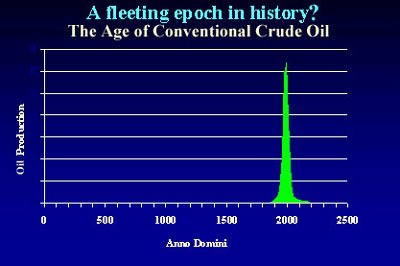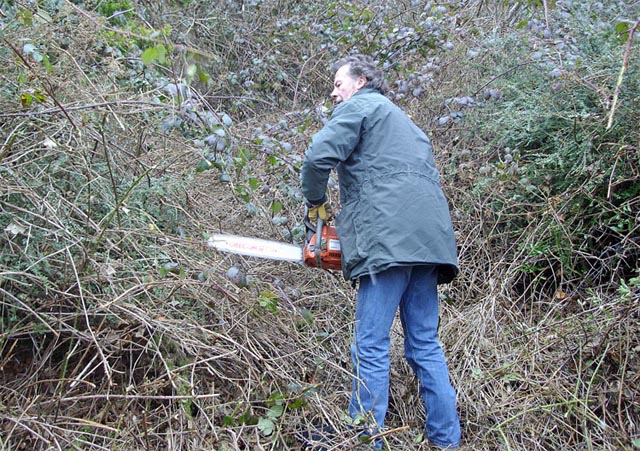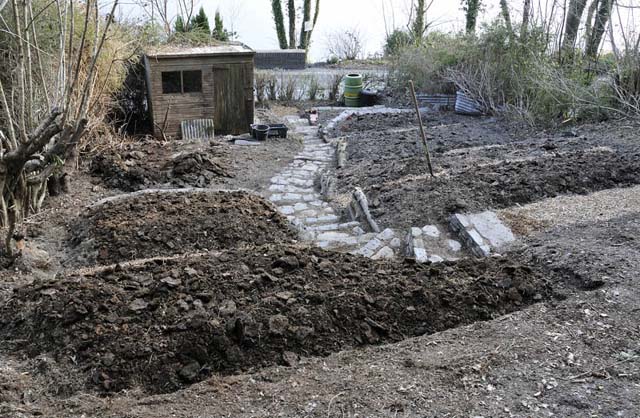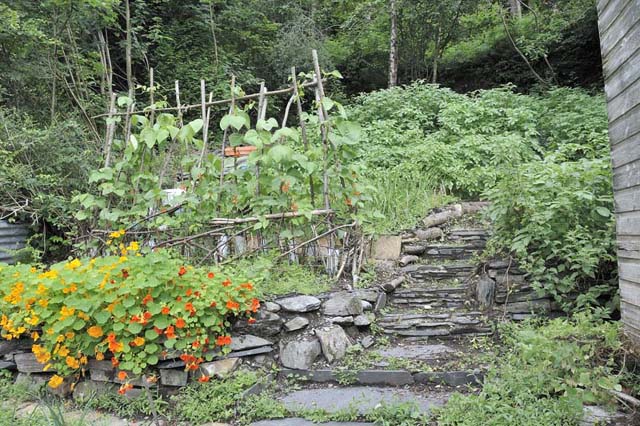- updated 7th/11th/13th/16th/23rd/29th March/11th April/1st/27th May/
6th July/2nd August/4th December 2009
Theme: Peak Oil, the Transition
Movement....
- and how to turn a bramble-infested
wilderness into a vegetable garden!
PART 1: Peak Oil and the Transition
Movement
23rd March: I've now split this up into
several pages as there are so many images!
Quick links to the other parts:
1. Peak Oil & the Transition Movement 2. Garden Clearance
3. Garden
Rebuilding
4. Garden
Planting 5. Garden
growing 6. The Harvest
BACK
TO WEATHER-BLOG MENU
New!
Fine Art Prints & digital images for sale-
Welsh Weather
& Dyfi Valley landscapes Slide-Library - Click HERE
Quiet conditions have dominated the second part of February, with milder temperatures and largely dry weather. This gives me chance to mention a few other things going on in my life at the moment.
If you haven't heard of Peak Oil (or Energy Security), Supply Crunch etc, then a quick explanation is necessary. These are all terms that refer to aspects of a lengthy crisis situation that we are walking blithely into. The Credit Crunch is in some ways tied into this in my view - I'll explain further down.
The
problem is very simple. Renewable natural resources such as
crops, if managed properly, will feed a certain number of people per
unit area every year ad infinitum, so that if enough land is under
crops, everyone can feasibly expect to be fed. On that way of life,
augmented by hunting, fishing and gathering, humans have lived for
millennia.
 The
coming of the Industrial Revolution, not a lot more than 200 years ago,
brought about a fundamental change in our ways. Increasingly, many
countries developed from societies based on renewable resources to
societies based more and more on non-renewable ones. This is where the
problem lies:
"non-renewable" refers to the replenishment time of a resource being
well outside of the human history timeframe. Many oilfields, for
example, were formed tens or hundreds of million years ago. Unlike
crops, you can't start them off in March and harvest them in September.
The
coming of the Industrial Revolution, not a lot more than 200 years ago,
brought about a fundamental change in our ways. Increasingly, many
countries developed from societies based on renewable resources to
societies based more and more on non-renewable ones. This is where the
problem lies:
"non-renewable" refers to the replenishment time of a resource being
well outside of the human history timeframe. Many oilfields, for
example, were formed tens or hundreds of million years ago. Unlike
crops, you can't start them off in March and harvest them in September.
Economic
Geology is the sub-discipline of that Earth Science which deals with
things from which money may be made by digging them or pumping them out
of the ground - coal, oil, diamonds, gold and so on. Put simply, an
"economic" mineral deposit is one that may be extracted with profit. An
"uneconomic" deposit is one that cannot be extracted with profit, and
so is left where it is. Since mining is almost entirely a private
sector activity, and is therefore profit-dependant, it is the economic
deposits that concern us here, and
one group in particular: our oil deposits.
The
products that are produced when crude oil is refined mostly have two
very
useful properties in common: they a) burn and are b) runny. The
advantages of these two properties in combination are immense: without
them we would not have the Internal Combustion Engine. Think about that
for a moment. Imagine society suddenly being faced with a decline in
the availability of the fuels that make internal combustion engines
run. What implications can you think of?
|
|
In 2008, the International Energy Agency (IEA) predicted that the supply of conventional crude oil would peak around 2030, just 21 years from now. Conventional crude is the easy-to-get oil that can simply be pumped from oil-wells. There are other sources, known as "non-conventional crude" - oil-shales, tar sands and so on. The difference with these is that they require a significantly greater energy input in order to extract the synthetic crude that can be prepared from them. Therefore, that synthetic crude costs more to obtain and therefore it is only profitable at much higher crude oil prices than the current $35-45 per barrel. |
In
the summer of 2008, an interesting thing happened to the crude oil
price. For some time, it had been bumbling along at $60-$75/barrel. But
it then began a steep climb to an unprecedented $147/barrel by
mid-July, after which the price collapsed even more steeply to current
levels. If you mouseover the graph above to the "5y" tab, it shows up
very well. What happened?
At
the time, there was much rumour doing the rounds that Peak Oil was
here: this was it. That may well have attracted some speculators to buy
into oil. More importantly, the collapse of the huge sub-prime market,
which had started over a year previously, was biting hard and investors
dived headlong from the finance sector into commodities (e.g. gold -
always regarded as a safe haven when the financial sector is in
trouble). Commodity prices were driven as high as they were until
speculators began to cash in on their "winnings", which in turn
precipitated falls across many of the commodity markets. With oil,
something else occurred. Many people were already badly affected by the
Credit Crunch: now, faced with sky-high fuel costs, they decided quite
naturally to use less: to do less road miles. So, demand for oil
products dropped (it's known as Demand Destruction), the price
plummeted and has remained depressed ever
since as the effects of the Credit Crunch and its consequent recession
bite harder and harder.
The
problem that this low oil price leads to is that it makes a variety of
oil deposits uneconomic, so that exploration and development projects
are being shelved in some cases.
What
happens when we move out of recession again? Demand for oil products
will rise and suppliers may struggle to play catch-up because of the
number of projects that are shelved - it can take years from
identifying a potential source to bringing the source online. The
scenario that we risk seeing is therefore one of supply-crunches
occurring BEFORE the IEA-predicted peak oil date,
driven not by geological but economic reasons.

Some
years ago, an experimental model of "energy descent" was put togther at
a college at Kinsale in the Irish Republic, as a means of getting
through such crises. The model focussed on several key points but
collectively they amount to voluntarily building strong resilience
within a community
to relatively hard times, thereby making those hard times easier. The
model's
core principles involved reskilling in terms of learning (often from
older generations before they take their handed-down skills with them)
about food and energy practises of the past and relocalisation - the
need to do more things more locally - such as food and energy
production. And, of course, the recognition of the problem in the first
place - our addictive, extremely vulnerable and wasteful
over-dependance on
<$70/barrel crude oil.

In
recognition of the challenges of the coming decades, the Kinsale model
of energy descent became known as Transition - and it has spread all
around the world, with people from community after community becoming
involved, from cities to villages. Transition Bro Ddyfi was formed in
2007 to cover this part of the world, and I quickly became involved. We
have organised an ongoing series of awareness-raising events with an
often good and at times surprisingly good attendance, with well-known
guest speakers,
films covering the issues and open discussion. It has been rewarding to
see the amount of people willing to engage with the problems of today
and of the future.
It
has been an interesting experience for me to date, especially in the
wider world, concerning peoples' reactions to the potential problems
that we face, both here on the ground and, more widely, in the
blogosphere. As a geologist who has worked on mineral deposits,
the understanding of future potential oil supply problems was
straightforward. Perhaps it is because of the timescales that we
geologists play around with that I found it easy to see the need to
plan for the long-term regarding the oil supply issue. That was my
personal experience anyway. I ended up spending a considerable amount
of time on the internet looking into ways I could live with a personal
energy usage akin to early 1950s levels. It all seemed feasible, if
hard work at times.
Reactions
elsewhere have varied from doom-and-gloom (recognition and
over-reaction) to mockery (outright denial). This is almost a carbon
copy (forgive the pun) of the climate change debate: polarisation into
two camps often seems to be the case with the general public when
anything comes along that is perceived to threaten our current
lifestyles in any way.
Key
to all of this is short-termism and the need to move away from it. We
live in a world where short-term gratification has become God to an
awful lot of people, whether it is the child relentlessly nagging Mummy
for more sweets because they finished the last lot five long minutes
ago, whether it is the remote control that saves you walking all the
way across your living room to change channels, or whether it is the
bloke sat at a pub table who texts his mate to remember the crisps when
he is up at the bar. None of these are things that we NEED - regardless
of whether we believe that they are. Compare them for a moment to the
African villager who may walk five miles for decent quality water for
drinking and cooking. I'm not at all sure that we are collectively any
happier than they are, for all our instant plastic-coated self-imagined
sophistication. The more of the stuff we get, the more we seem to want.
No
wonder one can find oneself unpopular in some quarters for suggesting
that elements of this may become compromised in the not-so-distant
future! But we live in a country that throws away >6 million tonnes
of food a year whilst people are starving in others. Forgive me for
suggesting there may be something wrong in the way we are doing things!
You
see it in politics too - the emphasis is too often seemingly centered
around a period of just a few years - up until the next election in
other words.
For
myself, the awareness of the real risk of future shrinkage of the
consumer-driven world has started a personal Transition - not so
much in actions so far but it has gotten me thinking about how it may
turn out. Visualising a world where people cooperate far more in order
to keep warm in Winter or maintain a good supply of high-quality
locally-grown food makes for appealing thinking. It sure beats
the vision of outright anarchy! I reckon it's better to be involved in
a practical, voluntary Transition to a functioning healthy community,
rather than see a global event-driven Transition forced upon us and the
dysfunction that could result. Now, where does one start?
From
this:

To
this:

in
70 man-hours spread over the period February 1st to March 23rd!
And
- by July 5th, this:

As
Barack Obama has famously said, "Yes - we can!"
Indeed,
one
way that these "Transition times" are manifesting themselves is the
massive upsurge in people setting out to grow their own food. I used to
help with this as a kid, when my folks grew their own veg, and the
opportunity to have a go recently came up, via a friend who had a
garden but wasn't using it and hadn't done for a decade or more. A
group of us arranged to take it on as a
project..... for the
illustrated, blow-by-blow account of this adventure, and how the
transformation between the two images above came about, read on!
Some Transition-related links:
http://www.transitiontownkinsale.org/
http://www.transitiontowns.org/
http://transitionculture.org/
http://www.transition-bro-ddyfi.org.uk/
1. Peak Oil & the Transition Movement 2. Garden Clearance
3. Garden
Rebuilding
BACK TO WEATHER-BLOG MENU
New! Fine Art Prints & digital images for sale-
Welsh Weather & Dyfi Valley landscapes Slide-Library - Click HERE